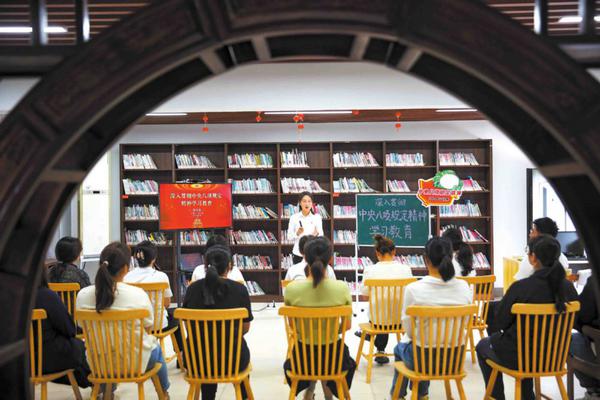 A young member of the Communist Party of China conducts a lecture on implementing the guiding principles of the eight-point code on June 6, at the Yaolin subdistrict of Nantong, Jiangsu province. XU HUI/FOR CHINA DAILY
A young member of the Communist Party of China conducts a lecture on implementing the guiding principles of the eight-point code on June 6, at the Yaolin subdistrict of Nantong, Jiangsu province. XU HUI/FOR CHINA DAILYHuang Dairong, a grassroots worker from Chongqing's Qianjiang district, used to spend most of her time in the office collecting data, filling out forms and researching material. Being able to visit a residential area to address people's difficulties face-to-face was a rare occurrence.
"I was often interrupted by frequent requests for data from various departments. One time, shortly after a local women's federation had collected data, the cultural department came asking for it, which cost me half a day looking at repetitive statistics and filling out forms," she said.
Thanks to a new "one-form" system, Huang now has more time to visit communities, interact with residents, and address their problems in person.
The intelligent platform system was launched by the Chongqing Municipal Committee of the Communist Party of China in March 2024. It consolidates data from various departments, standardizes it, and updates it in real-time, enabling seamless information sharing across different levels of government, from municipal agencies to districts and villages.
Data on topics such as Party building, economic growth, the rule of law, and people's livelihoods in a district or village is clear and easy to find. System users can also generate forms or reports automatically if needed, which has significantly boosted work efficiency.
This initiative has helped reduce time spent on tasks such as data collection and filling out forms by grassroots workers like Huang. It is also playing a vital role in the implementation of the guiding principles of the central Party leadership's eight-point code to improve work conduct and combat formalism, said Li Jianshu, an official from the municipal committee responsible for the system's operation.
The number of grassroots forms, the time spent processing them, and the number of staff members involved in the work, have all been reduced by 70 percent compared with the same period in 2023, Li said.
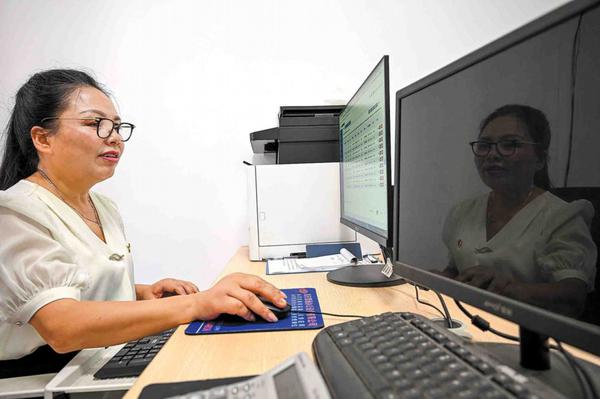 Community worker Jiang Chunyan collects data through the "one-form "system in Shuangshi county, Chongqing, on Friday. CHEN CHENG/XINHUA
Community worker Jiang Chunyan collects data through the "one-form "system in Shuangshi county, Chongqing, on Friday. CHEN CHENG/XINHUAStrong leadership
The Party's eight-point code refers to the improvement of Party and government conduct and the building of closer ties with the people.
It aims to enhance research methods, reduce meetings and celebratory events, reduce issuance of documents and briefings, reasonably arrange outbound visits, streamline security arrangements, reduce media coverage of high-ranking officials, prohibit publication under an individual's name, and encourage frugality.
The code was made public on Dec 4, 2012 following a Political Bureau meeting, convened days after Xi Jinping was elected as general secretary of the CPC Central Committee. Since then, Xi's steps to implement the code have never stopped.
In March, a Party-wide in-depth study and education campaign to implement the code on improving work conduct, was rolled out across China. It will run through late this month.
In May, an article based on excerpts of Xi's major statements related to the code was published in Qiushi Journal, a flagship magazine of the CPC Central Committee. In the article, Xi stressed that good work conduct is critical to the survival of a governing party.
Since the 18th CPC National Congress in 2012, the Party has faced its internal problems squarely, taking the formulation and implementation of the eight-point rules as a starting point to advance full and rigorous Party self-governance, the article said.
These efforts have led to significant improvements in Party conduct, the work practices of government officials, social morality and individual virtues, while enhancing the Party's image among the people, it said.
While reaffirming a strict approach in implementing the eight-point rules, the article also pointed out that efforts to strengthen Party and government conduct must align with the key requirement of maintaining a close bond with the people, guard against any slackness in the process, and remain vigilant against new covert forms of misconduct to resolutely prevent any resurgence of relevant problems.
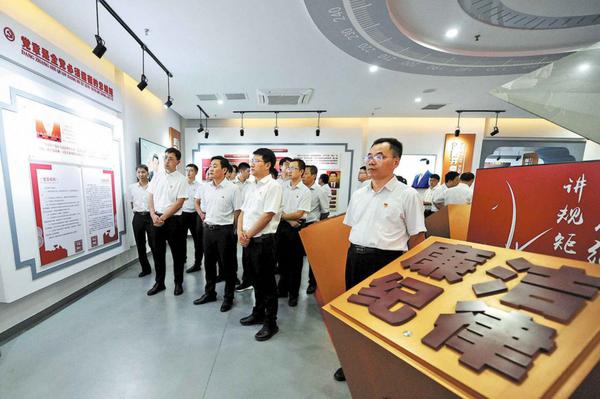 Party members from a subsidiary company of the Huaibei Mining Group visit an education center on anti-corruption in Huaibei, Anhui province, on June 6. HUANG SHIPENG/FOR CHINA DAILY
Party members from a subsidiary company of the Huaibei Mining Group visit an education center on anti-corruption in Huaibei, Anhui province, on June 6. HUANG SHIPENG/FOR CHINA DAILYFace-to-face services
Li, from Chongqing, has pledged to continue the optimization and expansion of the "one-form" system, and regards it as an innovation in improving work methods and enhancing grassroots governance.
"The ultimate goal of this innovation is to advance the Chinese path to modernization, better serve the people, and promote their sense of happiness, fulfillment and security," he said.
The system has been put into operation across all levels of government in Chongqing, including municipal departments, over 1,000 townships, and more than 9,000 villages. It is also being studied and emulated by other regions in the country.
Local residents and grassroots workers have experienced the benefits. Li Na, a villager from Xiaonanhai township in Qianjiang district, used to be frequently asked by village committee staff members to assist in collecting data on household populations and the number of elderly people left behind.
"With the new system in place, such requests have decreased, and the frequency of visits from our village officials has increased," she said. "I can focus more on my homestay business and have additional time to learn and exchange ideas outside the village."
Community worker Chen Junlin said he also now has more time for direct contact with people.
"The 'one-form' system has allowed me to respond to people's difficulties more quickly and address their problems more efficiently," said Chen while inspecting the repair of a water leak in a resident's home in Minzhu community in central Chongqing's Jiulongpo district in May.
"Not only can I access and update data on my laptop, but I can do so easily on my mobile phone anytime, anywhere," he added.
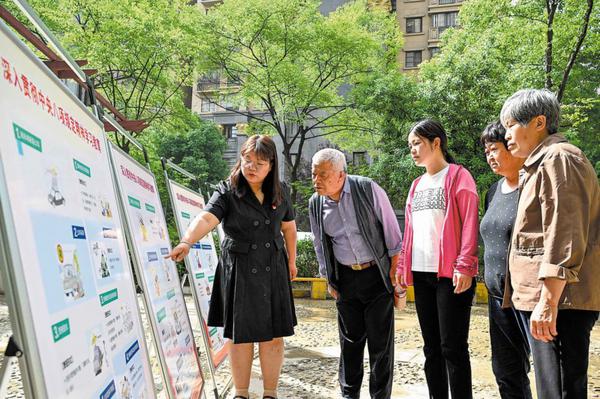 An official explains the content and practices of the eight-point code to residents in Hefei, Anhui province, on May 7. ZHAO MING/FOR CHINA DAILY
An official explains the content and practices of the eight-point code to residents in Hefei, Anhui province, on May 7. ZHAO MING/FOR CHINA DAILYNationwide action
Chongqing is not the only place exploring innovative ways to implement the guiding principles of the eight-point rules and improve work conduct.
Zheng Wenxing is a grassroots worker at Changhe subdistrict in Binjiang district, Hangzhou, Zhejiang province. He spent 60 days working as a delivery rider to better grasp the demands of the occupation.
He rode an electric scooter for about 2,900 kilometers and delivered 330 orders from five online platforms. This helped Zheng to better understand delivery riders' needs in regard to rest and supply stations, the People's Daily reported.
He decided to experience the life of a delivery rider after he discovered the rest stations provided by the subdistrict's service center for Party members and residents were rarely visited by riders. This was despite the stations being equipped with various services such as power banks, microwaves, electric charging piles, umbrellas and water heaters, the media reported.
"The experience changed my perception of delivery riders," Zheng was quoted as saying.
"For example, riders usually have tight delivery schedules and do not have time to charge their scooters, so they mainly rely on battery swaps. Therefore, the charging piles at the stations had a low usage rate. Instead of building stations and waiting for riders to come, we should build them in places where riders frequently go."
Following Zheng's experience, the subdistrict's Party organization relocated the stations to areas with more delivery riders, such as shopping centers and commercial zones, and added more useful service such as electric scooter repairs, maintenance, and roadside assistance.
In addition, four electric scooter shops were asked to provide free vehicle inspections and tire repairs for riders at new stations, the report said.
Zheng said the new stations are attracting more delivery riders. He added he still receives likes and feedback from couriers in a chat group.
Misconduct exposed
China's top anti-corruption watchdogs have also stepped up their efforts to warn and educate Party members and State officials about violations of the guiding principles of the eight-point code.
According to data released by the CPC Central Commission for Discipline Inspection and the National Commission of Supervision, over 24,000 people were criticized for violating the guiding principles of the eight-point rules in April. Of those, more than 16,000 received Party disciplinary and administrative punishments.
Instances of inaction or arbitrary actions in serving economic development and environmental protection accounted for 86.2 percent of the formalism and bureaucracy discovered in April. Hedonism and extravagance were mainly reflected in the illegal receipt of gifts and cash, illegal banquets and illegal distribution of allowances, the data showed.
From time to time details of some high-profile cases have been disclosed to demonstrate the central leadership's "zero tolerance "and high-pressure approach to such violations.
In May, the commissions published a case where 10 officials in Henan province attended a banquet that went against discipline.
Li Xianlin, a Party official in Luoshan county, Xinyang, Henan province, was given a banquet organized by nine others on March 22. Li and four people drank four bottles of white liquor that later led to the death of one person.
In an attempt to cover up the consumption of alcohol, Yu Guofang, Party chief of the county, did not report what happened to a higher authority, which constituted a disciplinary violation. To bury the case, Li and some others offered cash compensation to the family of the deceased.
The commissions said that the incident occurred during the in-depth study and education program on the eight-point code on improving Party conduct.
They said it was a typical case of ignoring Party discipline, and violating the rules in defiance of authority. It was also of an extremely serious nature and had an extremely negative impact, so all the Party members involved must be given harsh disciplinary punishments, they said.
Self-improvement
Song Fufan, a professor at the Party School of the CPC Central Committee, highlighted the importance of implementing the guiding principles of the Central leadership's eight-point code. It is a milestone in the Party's self-governance that has profoundly changed the political and social landscape of China, he said in an article posted on the school's WeChat account.
Wang Dongqi, another professor at the school, said via the account that issues involving work style are never trivial. The implementation of the rules and the improvement of work conduct are an unceasing endeavor, he stressed.
"Work conduct is always underway, because the attitude and performance of Party organizations at all levels and a large number of party members, directly relate to the Party's image and credibility, and the development of the Party and the people," he said.
"Party members and officials must resolutely oppose formalism, bureaucracy, hedonism, and extravagance, and truly be responsible to the people, serve the people, and receive the people's supervision," he said.
"We must maintain a high degree of self-awareness and self-improvement in leading social revolution, and adhere to governing the Party with a reform spirit and vigorous standards. Only in this way can we ensure the steady progress of China's modernization."











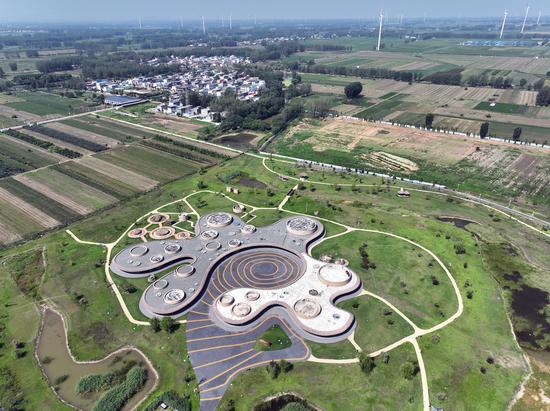



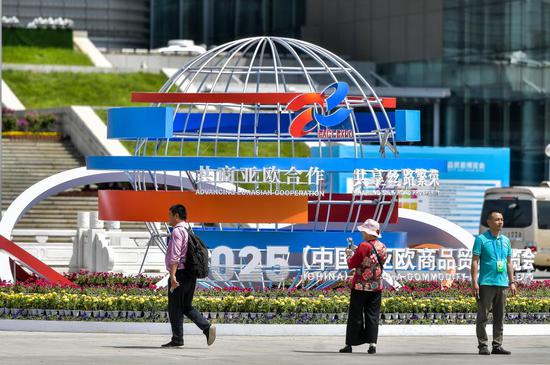







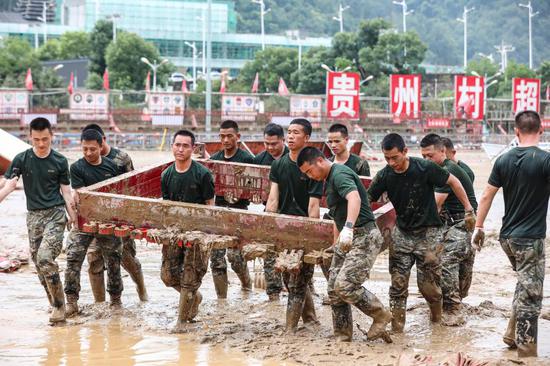
















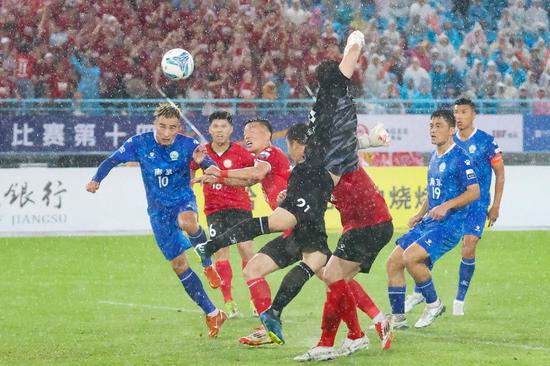









 京公網安備 11010202009201號
京公網安備 11010202009201號